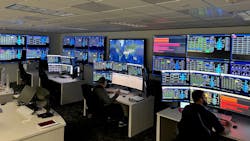Is the drilling industry leading the AI revolution or falling behind?
By Duco de Haan, MR Group; and Michael Fry, ModuSpec
In an era where artificial intelligence (AI) is transforming industries across the globe, the drilling sector stands at a pivotal moment. Despite its reputation for technological innovation in equipment and processes, the industry has been cautious in fully embracing AI-enabled solutions. However, economic pressures, safety concerns and environmental regulations are creating a perfect storm that may accelerate adoption.
The high risk and global nature of the drilling industry places it in the ideal position to lead the advancement of AI-enabled technologies. Yet, compared with other sectors like healthcare, finance and manufacturing, the drilling industry has been relatively slow to embrace its full potential.
Untapped potential of AI
While real-time monitoring for blowout preventers, predictive maintenance and drilling simulations have seen some success, that's only scratched the surface of what’s possible.
These early successes are compelling. AI-enabled systems now provide comprehensive digital fingerprinting of components, real-time condition monitoring and detailed anomaly documentation, significantly reducing non-productive time while enhancing safety. Additionally, regulatory bodies like the Bureau of Safety and Environmental Enforcement (BSEE) are increasingly mandating real-time monitoring in regions such as the Gulf of Mexico, accelerating adoption.
AI and machine learning are transforming how companies function. The opportunities are immense, and the drilling industry is ideally positioned to deploy new technology because the gains are huge.
Pioneering companies leading the way
Some forward-thinking organizations are already demonstrating the transformative potential of AI:
- ADNOC Drilling made headlines with its $733 million investment in three advanced AI-enabled island drilling rigs for the offshore Zakum Field. These rigs, being built by Honghua Group in partnership with ADNOC Drilling, are designed for extended reach drilling and capable of drilling wells more than 52,000 ft in length. With expected delivery and operation in 2026, this deal will expand ADNOC Drilling's fleet to at least 148 rigs by 2026.
- Equinor has implemented an AI-driven digital twin platform that creates virtual replicas of physical drilling operations, enabling real-time optimization.
- Shell has deployed machine learning algorithms that analyze historical drilling data to predict and prevent equipment failures, resulting in a significant reduction in unplanned downtime.
- ModuSpec has developed AI solutions focused on real-time blowout preventer monitoring and optimized predictive maintenance scheduling, addressing critical safety and efficiency challenges.
Implementation barriers
Despite the benefits demonstrated, widespread adoption faces several significant challenges:
- Data sovereignty and integration concerns: The highly sensitive nature of proprietary drilling data remains a key stumbling block, with a demand for tailored solutions that can work with siloed data systems without compromising data security or intellectual property.
- Investment horizons and ROI clarity: With volatile energy prices and pressure to maximize shareholder returns, drilling companies often struggle to justify the high upfront costs of AI implementation.
- Workforce readiness and change management: The drilling industry faces both an aging workforce and competition for digital talent with other sectors.
Leveraging generative AI
To predict the future, users must first learn from the past. This is where generative AI revolutionizes real-time monitoring by integrating historical data and lessons learned into real-time decision-making processes.
Generative AI is one of the most important tools a company can utilize. It is allowing companies to delve into vast amounts of historical lessons learned, inspection reports, maintenance history and operations logs. This integration empowers real-time decisions that significantly enhance operational efficiency and safety.
The drilling industry has so much data and historical knowledge sitting on hard drives and servers across networks. By accessing this information, the knowledge gap can be filled in the workforce and decision-making abilities can be accelerated.
Equipment only fails in so many ways; we have seen all of them. If historical failure data, procedural errors and lessons learned were accessed, think about the training that could be offered to the next generation of offshore workers.
Conclusion
At a time when the sector is facing a combination of complex economic, regulatory, environmental and reputational challenges, not to mention competing with other more attractive industries for skills, these technologies can help provide solutions.
The industry has a long history of innovation and of taking risks to achieve advances in safety and protecting the environment. The industry needs to create a sense of excitement around how technology can be used to make a positive difference and the speed of advancements.
With the speed of AI-infused technology development only likely to accelerate, the drilling industry has a fantastic opportunity to move from small-scale to full-scale adoption through increased investment and support.
AI provides vast opportunities to significantly increase safety, efficiency and optimize operations.
About the Author

Duco de Haan
Duco de Haan is CEO of MR Group. He has served in this role since July 2019.
MR Group comprises rig intake and inspection specialist ModuSpec, global oil and gas training provider Well Academy, and well engineering consultancy WellSpec.
He served in various management roles with ModuSpec for nearly 16 years from 1994-2010. Lloyd's Register (LR) acquired ModuSpec in 2008. As a result, he then spent more than eight years with LR, first serving as SVP Energy Americas, then as managing director/CEO of LR Drilling Integrity Services and then commercial development director energy.
He is based in the Netherlands.

Michael Fry
MR Group promoted Michael Fry to the newly created role of director of technology innovation in April 2025. He leads the company's technology vision, driving the development and deployment of solutions across the group’s businesses: ModuSpec, Well Academy and WellSpec.
His focus is on advancements in real-time monitoring, equipment reliability and training technologies, while accelerating the adoption of artificial intelligence and other transformative tools.
Prior to this role, he served as MR Deepwater Subsea LLC's service line director real-time monitoring service since October 2022, and he was also president and CEO from February 2015 to December 2022. He's also held several management positions with Vantage Drilling and Transocean.
